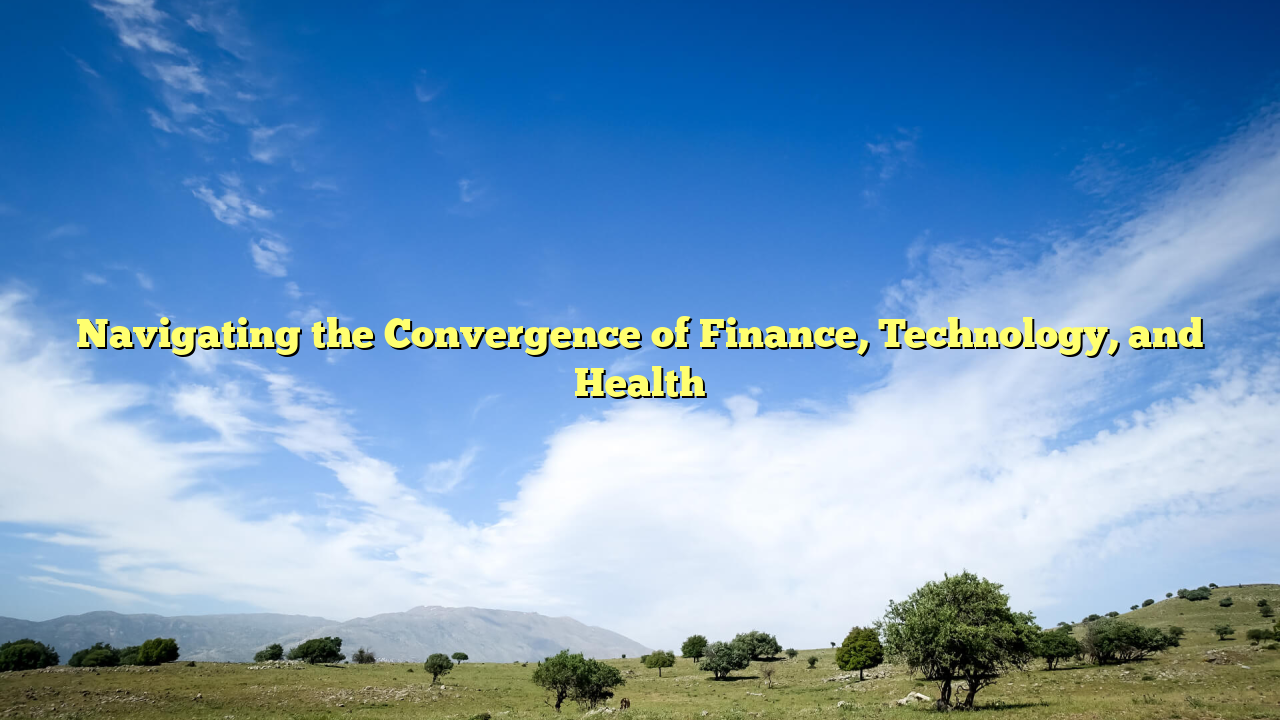As we move forward into the future, finance is increasingly intertwined with technological advancements. With innovations shaping every aspect of our lives, it is evident that technology is playing a significant role in shaping how we manage financial resources. Alongside this, human intelligence is paving the way for smarter, more efficient solutions in almost every industry, including healthcare. This article explores the convergence of finance, technological innovations, intelligence, and healthcare as they work together to create a healthier, more prosperous future.
Finance: The Evolving Landscape
In recent years, finance has undergone a significant transformation. Traditional financial systems, once dominated by banks and physical exchanges, have given way to digital platforms that offer more accessible and efficient solutions. This shift has been largely driven by technological innovation, allowing for faster transactions, greater financial inclusion, and a shift toward blockchain technology. As a result, financial institutions are no longer the gatekeepers of wealth; individuals and businesses can now take control of their financial future.
The rise of cryptocurrencies has been a game-changer in the finance sector. Cryptocurrency offer a decentralized way to store and transfer value, without the need for traditional intermediaries such as banks. This has made financial systems more transparent, secure, and accessible to people around the world. Additionally, distributed ledger technology has enabled the creation of smart contracts, which allow for automated, self-executing agreements that remove the need for intermediaries, reducing costs and increasing efficiency.
Artificial intelligence (AI) has also made a significant impact on finance, particularly in the realm of risk assessment. AI-powered algorithms can analyze vast amounts of data to predict market trends, identify investment opportunities, and optimize portfolios. This has made it possible for both individual investors and large financial institutions to make more informed decisions, enhancing profitability and reducing risk.
The Role of Technology in Shaping Our Future
Technology continues to drive innovation across all sectors, and its impact on society cannot be overstated. From machine learning to artificial intelligence, the possibilities are endless. The introduction of machine learning in various industries has already led to improvements in productivity, efficiency, and decision-making. As technology continues to evolve, it will shape everything from healthcare to entertainment, creating new opportunities and challenges.
One of the most significant technological advancements of recent years has been the development of deep learning. AI is transforming industries by enabling machines to learn from data and make decisions with minimal human intervention. In the finance sector, AI is being used to detect fraudulent transactions, optimize trading strategies, and provide personalized financial advice. In healthcare, AI is helping doctors diagnose diseases faster and more accurately, while in retail, it is being used to create more tailored experiences for consumers.
Another crucial area where technology is playing a significant role is in the realm of medical technology. The rise of telemedicine has made it easier for individuals to access healthcare services remotely, improving patient outcomes and reducing the strain on traditional healthcare systems. Furthermore, wearable devices like smartwatches are enabling individuals to take control of their own health, tracking metrics like heart rate, sleep patterns, and physical activity. This data can be used to inform lifestyle choices and improve overall well-being.
Harnessing Intelligence for a Better Future
Intelligence, both human and artificial, is at the heart of many of the advancements in finance, technology, and health. Human intelligence, combined with technological tools, allows us to solve problems that were once thought insurmountable. Meanwhile, artificial intelligence is evolving at an exponential rate, enabling machines to perform tasks that require complex reasoning, decision-making, and problem-solving.
One of the most exciting aspects of artificial intelligence is its ability to enhance human decision-making. AI-powered systems can process vast amounts of data in real-time, identifying patterns and providing insights that humans may overlook. This has profound implications for industries such as law, where making the right decision at the right time can have significant consequences.
Moreover, deep learning is enhancing our understanding of the human brain and cognition. With the help of AI, researchers are gaining insights into how the brain works, leading to breakthroughs in both neuroscience and artificial intelligence. This collaboration between human intelligence and machine learning is paving the way for smarter, more efficient solutions in various fields.
Improving Health Through Innovation
As technology continues to evolve, it is having a profound impact on the field of healthcare. Advances in medical research are enabling scientists to develop new treatments for diseases that were once considered incurable. In addition, the use of machine learning is helping doctors make more accurate diagnoses, predict patient outcomes, and create personalized treatment plans.
One of the most exciting developments in healthcare is the rise of personalized medicine. By analyzing a patient’s genetic makeup, doctors can tailor treatments to the individual’s unique needs, increasing the likelihood of successful outcomes. Additionally, AI-powered tools are being used to predict the likelihood of developing certain conditions, allowing for earlier interventions and preventive care.
Telemedicine has also revolutionized the way healthcare is delivered. Patients can now consult with doctors remotely, reducing the need for in-person visits and improving access to care, especially in rural or underserved areas. This is particularly important as healthcare systems around the world are facing increasing pressure due to aging populations and rising healthcare costs.
Furthermore, the integration of wearable devices is allowing individuals to take charge of their own health. These devices can monitor vital signs, track physical activity, and provide real-time feedback on lifestyle choices. This data can then be shared with healthcare providers, leading to more personalized and proactive care.
Conclusion: A New Era of Interconnectedness
The future of finance, technology, intelligence, and health is interconnected. As these fields continue to evolve, they will work together to create a more prosperous and healthy society. Finance will continue to be shaped by technological advancements, enabling greater financial inclusion and efficiency. Technology will drive progress across all sectors, improving productivity, decision-making, and overall quality of life. Both human and artificial intelligence will unlock new possibilities for solving complex problems and enhancing our understanding of the world. Finally, well-being will continue to improve as technology enables more personalized and accessible care.
In Bayar4D Alternatif , the integration of finance, technology, intelligence, and health promises to reshape the way we live, work, and interact with one another. The future is one of infinite possibilities, where these interconnected fields converge to create a world that is healthier, more equitable, and more innovative.
The Future of Finance, Technology, Intelligence, and Health: A New Era of Interconnectedness



